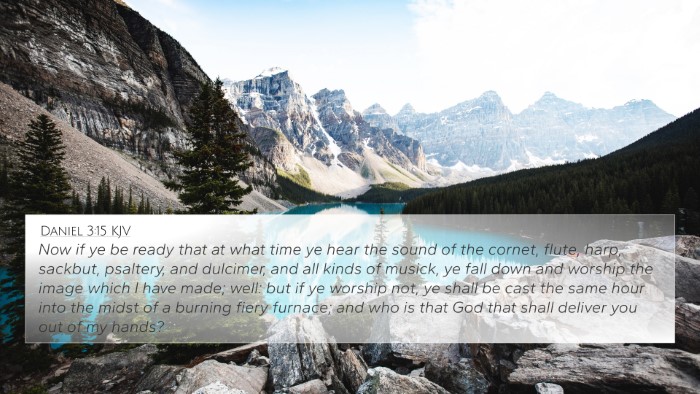Understanding 2 Kings 18:29
Bible Verse: 2 Kings 18:29
Verse Text: "Thus saith the king, Let not Hezekiah deceive you: for he shall not be able to deliver you out of his hand."
Summary of Meaning
This verse presents an essential moment during the reign of King Hezekiah of Judah, where the Assyrian king, Sennacherib, attempts to discredit Hezekiah's trust in God’s deliverance. It demonstrates the tension between faith and intimidation from powerful adversaries.
Insights from Commentaries
-
Matthew Henry: Henry notes that the Assyrian king's words were meant to instill fear. The intent was to undermine the people's faith in Hezekiah by questioning his ability to protect them, directly challenging the prophetic encouragement they received. This reflects a common tactic of adversaries throughout Scripture, attempting to sow doubt amidst a believer's resolve.
-
Albert Barnes: Barnes elaborates on the theological implications, emphasizing how Hezekiah's trust in God is crucial, especially when faced with doubt and fear from the enemy. According to Barnes, this highlights the overarching assurance believers can have in God, contrasting human vulnerability with divine strength.
-
Adam Clarke: Clarke points out that the verse is part of a broader dialogue where Assyrian envoys seek to persuade the people of Judah to bargain with them instead of relying on their king. This indicates the psychological warfare of the Assyrians, aiming to demoralize and manipulate through fear rather than direct confrontation.
Thematic Connections and Cross References
This passage resonates with several links across the Scriptures that highlight themes of faith, obedience, and divine deliverance:
- Isaiah 36:15: A parallel where the Assyrian capture of Jerusalem is similarly challenged, reinforcing Hezekiah’s reliance on God.
- 2 Chronicles 32:7-8: Provides further insight into Hezekiah’s encouragement to his people in the face of Sennacherib's threats.
- Psalm 31:1-3: The psalmist's cry for divine refuge complements the themes of reliance and trust in God amidst peril.
- Jeremiah 17:5: Offers a direct contrast, stating that trusting in man leads to curse, while putting faith in God leads to blessings.
- Proverbs 3:5-6: Emphasizes trust in the Lord for guidance, particularly relevant to the challenges faced by Hezekiah.
- Hebrews 11:6: This New Testament verse highlights the necessity of faith to please God, connecting to the faith exhibited by Hezekiah.
- Matthew 10:28: Jesus teaches that one should not fear those who can harm the body but to have a reverent fear of God, resonating with the themes of trust and fear.
- Isaiah 40:31: Those who wait on the Lord will find renewed strength, paralleling the assurance Hezekiah offers his people amidst uncertainty.
- Philippians 4:6-7: Advocates for not being anxious but rather trusting God, embodying the essence of Hezekiah’s reliance in this crisis.
- Romans 8:31: If God is for us, none can stand against; a confident proclamation that mirrors the assertion of faith amidst opposition as seen in 2 Kings 18:29.
Application and Reflection
The encounter depicted in 2 Kings 18:29 calls readers to discern the true sources of security and fear in their own lives. In facing modern adversities, whether personal or communal, the lesson remains to trust in God's sovereignty and not yield to external pressures that aim to undermine faith. Such reflections ought to encourage believers to use tools for Bible cross-referencing to uncover related themes across the Scriptures, fostering deeper understanding and trust in God.
Conclusion
In conclusion, 2 Kings 18:29 serves as a potent reminder of the challenges faced by believers and the vital necessity of faith in God’s deliverance. It encourages a practice of cross-referencing Biblical texts to illuminate connections, deepen spiritual understanding, and cultivate resilience in the face of doubt and fear. Connecting scripture through tools like Bible concordance and cross-reference guides plays an invaluable role in enriching one's faith journey, fostering a comprehensive grasp of the divine promises encapsulated in the Word.










